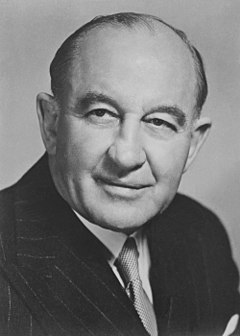William McKell
|
The Right Honourable Sir William McKell GCMG |
|
|---|---|
 |
|
| 12th Governor-General of Australia | |
|
In office 11 March 1947 – 8 May 1953 |
|
| Monarch |
George VI Elizabeth II |
| Prime Minister |
Ben Chifley (1947–49) Robert Menzies (1949–53) |
| Preceded by | HRH The Duke of Gloucester |
| Succeeded by | Sir William Slim |
| 27th Premier of New South Wales Elections: 1941, 1944 |
|
|
In office 16 May 1941 – 6 February 1947 |
|
| Governor |
The Lord Wakehurst (1941–46) Sir John Northcott (1946–47) |
| Deputy | Jack Baddeley |
| Preceded by | Alexander Mair |
| Succeeded by | James McGirr |
| Member of the New South Wales Parliament for Redfern |
|
|
In office 24 March 1917 – 18 February 1920 |
|
| Preceded by | James McGowen |
| Succeeded by | District abolished |
|
In office 8 October 1927 – 6 February 1947 |
|
| Preceded by | New district |
| Succeeded by | George Noble |
| Personal details | |
| Born |
26 September 1891 Pambula, New South Wales |
| Died | 11 January 1985 (aged 93) Waverley, New South Wales |
| Resting place | Northern Suburbs Crematorium, Sydney |
| Political party | Australian Labor Party |
| Spouse(s) | Mary Pye |
| Religion | Anglican |
Sir William John McKell GCMG (26 September 1891 – 11 January 1985) was an Australian politician, Premier of New South Wales from 1941 to 1947, and the 12th Governor-General of Australia from 1947 to 1953. He was the longest-lived Governor-General, aged 93 when he died.
McKell was born in Pambula, New South Wales, the son of a butcher named Robert Pollock McKell, who abandoned his wife and their four children. For the rest of his life, McKell avoided discussing the matter by saying his father had died young. He was educated in Sydney at Bourke Street Public School and became a boilermaker, and was state secretary of the Boilermakers' Union from 1915.
He was elected to the New South Wales Legislative Assembly as a Labor member for Redfern in 1917 and retained the seat until he resigned to become Governor-General in 1947, except for the period of proportional representation (1920–1927), when he was a member for Botany. In 1920 he married Mary Pye. While in Parliament he studied law, and became a barrister in 1925. In Jack Lang's Labor governments of 1925–27 and 1931–32 he was Minister for Justice, and was also Minister for Local Government in 1930–31.
During the 1930s McKell became a leader of that element within the Labor Party which was becoming increasingly frustrated at Lang's dictatorial attitudes and continued unpopularity with voters (having lost the premiership in 1932, Lang was again easily defeated in the elections of 1935 and 1938). In 1939 McKell and his supporters staged a caucus coup and ousted Lang as leader; McKell was elected his successor.
...
Wikipedia
